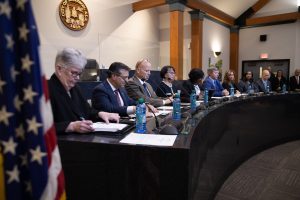Jet Wildlife Team securing state-level certification for wildlife zone
Members of the Jet Wildlife Team install a sign at the wildlife area at James Clemens High School. (CONTRIBUTED)
MADISON – The Jet Wildlife Team is working with the Alabama Wildlife Federation to earn certification for the school’s wildlife area from the Alabama Department of State.
James Clemens High School’s wildlife area is located behind the south parking lot, beyond the pond and near the tennis courts.
The Jet Wildlife Team committed to enhance the space “by transforming it into a place of discovery, excitement and student engagement,” sponsor Patricia Williams said. Their outdoor classroom will permit access to the community.
Also, this transformation will allow an alternative classroom setting and multi-disciplinary teaching and learning opportunities about wildlife. Classes will have “real-world experiences in a living laboratory,” Williams said.
The area has “numerous producers/plants and consumers/animals,” including native and non-native species, like Chinese privet; thistles; geese and other birds; turtles; frogs; spiders and other insects that “ensure energy flow in food chains,” Williams said.
The ecosystem’s water supply is a Blue Line water system, protected by the state.
To earn federation certification, the James Clemens club must a planning committee, short- and long-term goals in a master plan, outdoor learning stations and activities, wildlife habitat, an in-service outdoor classroom workshop and a maintenance plan.
The outdoor classroom can serve as a model for other Alabama schools, Williams said.
The James Clemens community can use the property as a discussion zone about indigenous animals; for leisure and exercising; possible art and pet shows; harvesting fresh fruits, vegetables and herbaceous plants; and fundraising, like an Easter egg hunt, Williams said.
“Biology teachers have access to observe, analyze and collect quantitative and qualitative data about living species,” Williams said. “This data can be shared nationally.”
Club officers are president Taylor Robinson, vice president Luke Yeom and treasurer Nicholas Albert.
The club’s founding “was stimulated by a thought about environmental responsibility,” Williams said. “I thought students should learn how to conserve and sustain wildlife zones to ensure the animals have a place for shelter, food and nesting.”
















